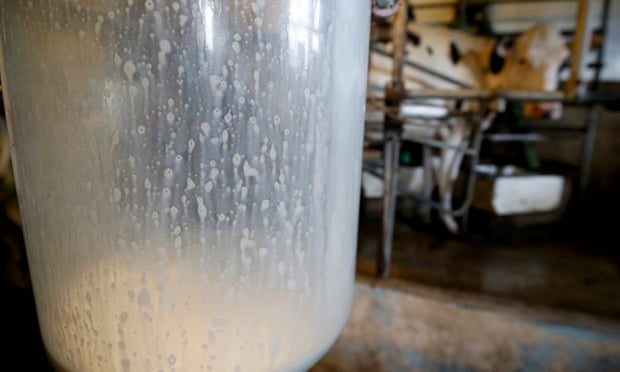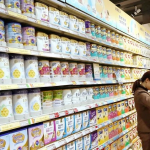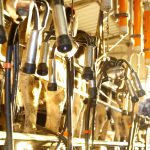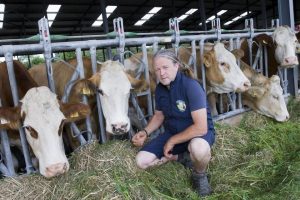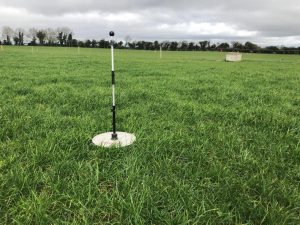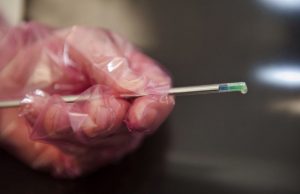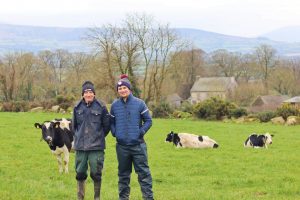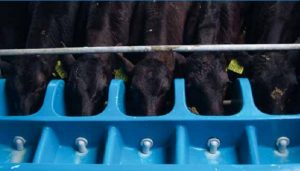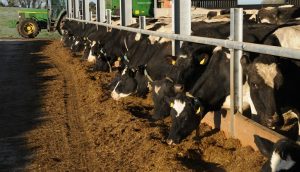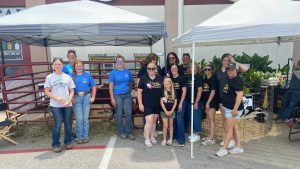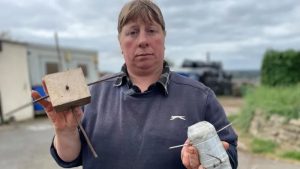
Northern Ireland is facing a Brexit “milk lake” in the event of a no-deal departure, it has emerged.
A senior EU official has confirmed that if the UK crashes out of the bloc in nine days, controls will have to be in place on day one for milk and other animal products coming from Northern Ireland.
It means farmers who currently sell their milk to cheese and butter producers south of the border may be told they can no longer do so because the EU will not accept creamery tanks containing “mixed” EU and third-country milk.
Dairy farmers are also facing a second potential killer to their business in the form of a 19p EU tariff.
This could almost double the cost of their milk to food producers in the Irish Republic, who currently pay them about 26p per litre of milk, farming leaders said.
“If there is no deal next week, it won’t be good whichever way you look at it,” said Mike Johnston, the Northern Ireland director of Dairy UK.
The EU’s controls on milk stem from its need to protect the single market and ensure no third-country products slip in over the porous Irish border.
It would mean Northern Ireland milk would have to be separated from Irish milk from day one, spelling an end to the routine practice of cross-border collections, an EU source said.
“At the moment tanks collecting milk from farms could cross the border seven or eight times.
“If there is no deal it is going to be hard to continue collecting milk in the north. Tanks mixing sources of milk will not be allowed.
“From the commission’s point of view all of the necessary controls have to be in place from day one,” the source said.
If such routine collections were to end, Northern Ireland would be left with a surplus of milk, reminiscent of the wine lakes and butter mountains of the EU’s past.
Currently about 30% of milk from across Northern Ireland, some 700m-800m litres, crosses the border to buyers in the Irish Republic for cheese, butter and dried milk production.
Johnston said: “Farmers are very, very concerned.”
Separately it emerged that the UK would be subjected to a de facto ban on exports of animals, meat and food products.
EU officials said on Thursday that the UK had not yet passed the necessary statutory instruments that would make it “an authorised third country” allowed to export animals and food into the bloc.
“We are still waiting for the UK to pass the necessary laws to reassure us that the standards they will have post-Brexit will be sufficient,” an EU official said.
“Until these products are listed there is absolutely no live animal that can come anywhere close to a border and the same for the products.”
The National Farmers Union has previously warned that this would lead to a de facto ban on exports for six months.
EU food and animal standards were overhauled after the BSE crisis that officials are quick to recall originated in the UK. An EU expert committee could make a decision next week, if British laws have been passed.
The EU’s biggest no-deal problem is squaring the circle of the Irish border, avoiding border infrastructure to preserve peace, while ensuring checks take place to stop illegal goods arriving in the European single market.
An official insisted Irish border plans would be ready, while not revealing where checks would take place. “Will the plans be ready? Yes they will and this is exactly why we are working so intensively with the Irish authorities.”
The Irish government has consistently said it will not have checks on the border in the event of no deal but has not revealed any contingency plans for mandatory EU checks.
One EU source said live animals could be certified for customs checks at abattoirs or meat packing plants in the republic. This would mean sheep from Fermanagh could continue to be exported for slaughter 100 miles south of the border in abattoirs in Kildare.
However, there are concerns that the sanitary and phyto-sanitary checks that are normally mandatory on the border could not be done so far away because of the risk of disease contagion.
There is also concern in the EU that there is currently only one border inspection post in Ireland where SPS checks are currently done and it is located at Dublin Port, miles away from the border.
Johnston said there was a “degree of clarity” on how the British government would treat animals and food crossing the border into the north when they announced there would be no checks or tariffs applied, but “not the other way around”.
Farmers are carrying on as normal, he said, but the lack of discussion on no-deal planning “has heightened awareness of the full impact of no deal”.
A spokesman for the Irish Revenue Commissioners said its “over-arching approach is to carry out the required customs controls to the greatest extent possible at the traders’ premises, away from the ports and airports”.
He added that Revenue was “strongly focused on facilitating the efficient and timely movement of goods in compliance with customs controls, post Brexit” and would “continue to work to support trade and businesses in order to maintain high levels of voluntary compliance”.
